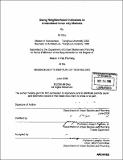Using neighborhood indicators to understand inner city markets
Author(s)
Diao, Mi, Ph. D. Massachusetts Institute of Technology
DownloadFull printable version (16.90Mb)
Other Contributors
Massachusetts Institute of Technology. Dept. of Urban Studies and Planning.
Advisor
Joseph Ferreira, Jr.
Terms of use
Metadata
Show full item recordAbstract
The economic distress of America's inner cities is one of the most pressing issues facing the nation. Many analysts have asserted the unmet retail demand in inner-city neighborhoods and the potential for translating this demand into investment. Tapping the unmet retail demand has been considered an important strategy to accelerate the economic development in inner cities. The purpose of this study is to propose an analytical framework that can reveal the spatial patterns of retail markets and test whether and to what extent inner-city neighborhoods are actually 'under served'. With the help of Geographic Information Systems (GIS) and Relational Database Management System (RDBMS) tools, this study designs and calculates neighborhood indicators of the demand, supply and gaps in retail markets with census tract level socioeconomic data and parcel level business data. Based on the indicators, econometric models are developed to quantitatively estimate the 'pure' impact of an inner-city location on the local retail supply level. The neighborhood indicator system is applied to the food store markets in the Boston Metropolitan Statistical Area (MSA). (cont.) Econometric analysis shows that inner-city tracts have an annual food store retail sales level (in millions of dollars per square mile) that is significantly lower than non inner-city tracts in the Boston MSA, after controlling for other factors that may influence retail supply level. The proposed analytical framework can be easily applied to other retail markets as well as other MSAs. The spatial patterns of retail markets revealed by the neighborhood indicators can be helpful for business owners to identify opportunities for future business expansion or recruitment.
Description
Thesis (M.C.P.)--Massachusetts Institute of Technology, Dept. of Urban Studies and Planning, 2006. Includes bibliographical references (p. 107-108).
Date issued
2006Department
Massachusetts Institute of Technology. Department of Urban Studies and PlanningPublisher
Massachusetts Institute of Technology
Keywords
Urban Studies and Planning.